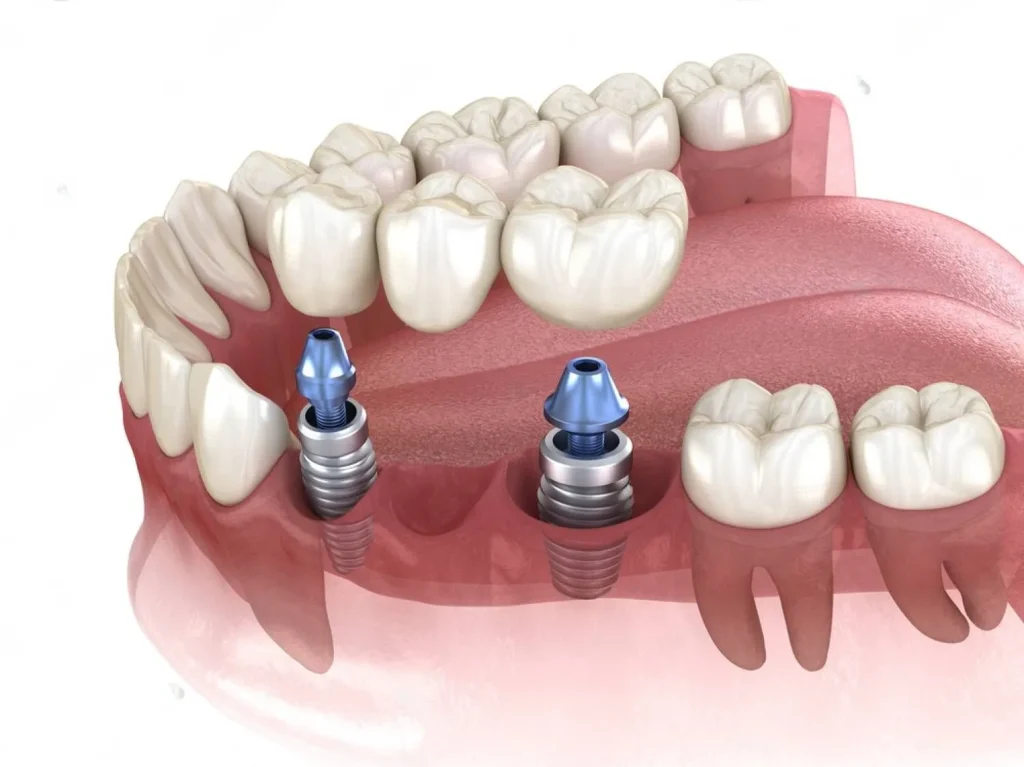
Missing teeth can affect more than just your smile—they can also impact your ability to chew, speak, and maintain proper oral health. Dental bridges are one of the most effective and common solutions to replace missing teeth and restore the function and aesthetics of your smile. In this article, we will delve into the world of dental bridges, exploring different types, comparisons with dental implants, costs, and their specific use for front teeth.
What is a Dental Bridge?
A dental bridge is a fixed dental restoration used to replace one or more missing teeth by literally “bridging” the gap left behind. It typically consists of:
- Abutment Teeth: The natural teeth or dental implants on either side of the gap that serve as anchors for the bridge.
- Pontics: The artificial teeth that fill the gap and are secured to the abutment teeth.
Dental bridges are a reliable way to restore the appearance and functionality of your smile, prevent surrounding teeth from shifting, and maintain proper bite alignment.
Types of Dental Bridges
- Traditional Dental Bridge: This involves creating crowns for the abutment teeth and placing the pontic(s) in between.
- Cantilever Bridge: Used when there is only one abutment tooth available to anchor the bridge.
- Maryland Bonded Bridge: Utilizes a metal or porcelain framework bonded to the back of the abutment teeth without the need for crowns.
- Implant-Supported Bridge: Anchored directly to dental implants rather than natural teeth, providing greater stability and durability.
What is a Dental Implant Bridge?
A dental implant bridge is a type of dental bridge supported by dental implants rather than natural teeth. This option is ideal when multiple teeth are missing in a row. Here’s how it works:
- Placement of Implants: Dental implants are surgically placed into the jawbone to act as artificial tooth roots.
- Attachment of Bridge: Once the implants have healed and integrated with the jawbone, the dental bridge is securely attached to the implants.
Benefits of Dental Implant Bridges:
- Longevity and durability
- Prevents bone loss by stimulating the jawbone
- Improved stability and functionality
- Does not rely on adjacent teeth for support
Dental Bridge vs. Implant
Choosing between a dental bridge and an implant depends on various factors such as oral health, budget, and personal preferences. Here’s a comparison to help you decide:
| Feature | Dental Bridge | Dental Implant |
|---|---|---|
| Support | Uses adjacent teeth as anchors | Supported by implants in the jawbone |
| Durability | Lasts 10-15 years with proper care | Can last a lifetime |
| Bone Preservation | Does not prevent bone loss | Prevents bone loss |
| Treatment Time | Shorter | Longer due to healing time |
| Cost | Generally less expensive upfront | Higher initial cost |
Cost of Dental Bridge: How Much Does a Dental Implant Bridge Cost?
The cost of a dental bridge can vary based on several factors, including the type of bridge, materials used, and the number of teeth being replaced. Below is a general breakdown:
- Traditional Dental Bridge: $2,000 to $5,000 per pontic and abutment crown.
- Implant-Supported Bridge: $5,000 to $15,000 or more, depending on the number of implants and materials used.
While dental implant bridges have a higher initial cost, they often prove more cost-effective in the long run due to their longevity and lower maintenance needs.
Tooth Implant vs. Dental Bridge: Which is Right for You?
Here are key factors to consider when choosing between a tooth implant and a dental bridge:
- Oral Health: If adjacent teeth are healthy, an implant may be the better choice to avoid altering them. Conversely, a bridge might be suitable if the adjacent teeth already require crowns.
- Jawbone Health: Implants require sufficient jawbone for placement, whereas bridges do not.
- Budget: Implants are more expensive upfront but last longer, while bridges are less costly initially but may require replacement sooner.
- Aesthetic Preferences: Both options provide natural-looking results, but implants tend to feel more like natural teeth.
- Time: Bridges are faster to complete, whereas implants require a longer healing period.
Consulting with your dentist can help determine the best option for your unique needs.
Dental Bridge for Front Teeth
Replacing missing front teeth requires special attention to aesthetics and functionality. Dental bridges for front teeth are designed to blend seamlessly with your natural smile while restoring your ability to bite and speak effectively.
Types of Front Teeth Bridges:
- Maryland Bonded Bridge: A conservative option that preserves the natural tooth structure of the adjacent teeth.
- Traditional Bridge: Offers more durability and strength, particularly for patients with significant gaps.
Considerations for Front Teeth Bridges:
- Material Selection: Porcelain or ceramic materials are often used for front teeth to provide a natural appearance.
- Aesthetic Integration: Proper color matching and design ensure the bridge complements your existing teeth.
Maintaining Your Dental Bridge
Proper care and maintenance are crucial for the longevity of your dental bridge. Here are some tips:
- Oral Hygiene: Brush twice daily and floss under the bridge using specialized floss or interdental brushes.
- Regular Dental Checkups: Visit your dentist regularly to ensure the bridge remains in good condition.
- Avoid Hard Foods: Minimize the risk of damage by avoiding excessively hard or sticky foods.
Final Thoughts
Dental bridges are a versatile and effective solution for replacing missing teeth, whether you choose a traditional bridge or an implant-supported option. Understanding the differences, costs, and benefits of each type can help you make an informed decision about your oral health. If you’re considering a dental bridge, schedule a consultation with our dental office to discuss your needs and determine the best treatment option for restoring your smile.
Dr. Argina Kudaverdian – Los Angeles, CA.
32ology Dental Studio – General & Cosmetic Dentistry
18740 Ventura Blvd., Ste 108 Tarzana CA 91356
Tel.: (818) 776-1236
Serving : Tarzana | Sherman Oaks | Encino | Woodland Hills | West Hills | Reseda